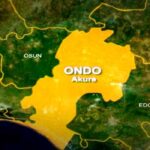One such move was the bilateral agreement between Nigeria and South Korea which culminated in the signing of Memorandum of Understanding (MOU) between the two countries.
In fact, in the drive to attract foreign investment into Nigeria and develop infrastructure in the downstream sector of the economy, the Nigerian government, under Obasanjo sought Korea’s investment in Nigeria spelling out the various opportunities that abound thereat.
Report had it that the Korean government on the other hand, in its quest to attain energy sustainability, considered what Nigeria offered following which series of bilateral discussions and negotiations were held between the two countries culminating in the signing of an MoU in July 2005.
The kernel of the bilateral agreement was to give preferential rights on two deep offshore blocks to the Korean consortium in the 2005 bid round and the Korean consortium would in turn make investments in the downstream sector.
It also entailed the Korean consortium would construct two gas-powered electric generating plants to generate a total of 2,250MW and a gas pipeline for the purpose of supplying gas into the gas–fired power plants.
Because of all this, the 2005 bid round conducted in Nigeria by the Ministry of Petroleum gave preferential rights to KNOC.
This was in the form of holding the right of first refusal on two blocks meaning that it only had to match whatever offer the highest bidder posted and KNOC would have the first right to the blocks except it refused to exercise such right.
KNOC exercised this right by matching ONGC’s $485 million of signature bonus (being the sum total signature bonus on the two blocks – OPLs 321 & 323) and in essence was allocated the blocks.
As an incentive to encourage the Korean consortium towards executing its downstream commitment, part of the signature bonus was suspended to encourage the $6 billion downstream investment as contained in a side-letter issued by the presidency in January 2006.
But an official of the Ministry of Petroleum Resources told our correspondent that the so-called discount was not an automatic discount.
According to him, the Korean consortium paid $192million cash and dropped an irrevocable standby letter of credit from a reputable international bank and drew same in favour of the Federal Ministry of Finance to the tune of $231million.
He explained that the guarantee for the amount in the letter of credit was the balance of the total $323 adding that the $323 represented the Korean consortium’s share of the $85million signature bonus for its stake in the two oil blocks while Equator Exploration paid up the balance of $162million to sum up to the $485million.
Having fulfilled all conditions as outlined in the Petroleum Act, the Production Sharing Contract (PSC) on the blocks was signed in March 2006 and in effect 60 per cent stake in these blocks were awarded to the Korean consortium with KNOC as Operators, 30per cent to British firm, Equator Exploration Limited and 10 per cent each to local firms NJ Exploration Limited and Tulip Energy Resources Limited in OPLs 323 & 321 respectively.
Exploratory works on the blocks commenced in earnest in 2006 resulting in four exploratory wells scheduled to be drilled starting from the 3rd quarter of 2009.
In fulfilment of its downstream commitment, the federal government through the NNPC and the Korean firm established the Steering Committee and Working Committee in June 2006 to manage the downstream projects and had approved the construction of a 48” diameter Ajaokuta-Abuja-Kano gas pipeline and two gas-fired power plants: 1,350MW in Abuja and 900MW in Kaduna. They were in harmony with the National Gas Master Plan. The Ajaokuta-Abuja–Kano Pipeline was to serve as the main trunk of the Trans-Sahara Gas Pipeline.
It was gathered from reports that NNPC which supervised the projects as part of the national strategic projects admitted that Korean consortium had completed feasibility studies for both the Power Plants and the Gas Pipeline. Sites of power plants had been designated in Gwagwalada, Abuja and Mando in Kaduna.
It was also gathered that Environmental Impact Assessment (EIA), Geotechnical study and Underground Water Investigation had been undertaken and concluded.
The development plan was agreed in early October 2008 and approval was being awaited from the Steering Committee. Current status of the project is negotiating commercial terms of the project amongst the stakeholders including the Nigerian authorities.
While the Consortium had 18 months to commence work on the downstream project, the Letter of Credit had a tenor of two years, which was supposed to be extended accordingly to cover project period and guarantee the implementation of the projects.
But during the life of this tenor and whilst the downstream project was progressing steadily as spelt out above, Nigerian authorities came up with the policy of a Nigerian Gas Master Plan.
This essentially meant that works on the downstream project would have to await the new National Gas Master Plan which had the intention of re-routing the gas pipeline and a change in the diameter of pipes to be used on the project. Consequently, the Steering Committee whose membership included top government officials requested an extension on the commencement period of the downstream project by 13 months to accommodate the changes in the Gas Master Plan which effectively required a further extension on the tenor of the LC.
This extension was resolved and an extension of the tenor of the LC was made accordingly for two more years.
KNOC however, said it received a letter on the 9th of January,2009 purportedly issued from the Office of the Minister of State for Petroleum conveying the federal government’s approval to void the allocation of these blocks to the Korean consortium allegedly due to KNOC’s non-fulfilment of an agreement to pay up the prescribed signature bonus in 2005.
The letter stated that the blocks were going to be re-awarded to ONGC on condition of ONGC’s full payment of the signature bonuses.
The MOU stated that if either of the parties intended and was willing to end the relationship adequate procedure was contained to be followed.
In their possession was agreement or Production Sharing Contracts (PSCs) on the two blocks which also outlined in details all the process of rescinding in the instance that either of the parties defaulted or wished to end the business deals.
An official of the Ministry of Petroleum Resources however said the ministry was still studying the documents perfecting the agreement with a view to giving accurate response to the Korean consortium’s claim.
When called on phone, Group Public Affairs Manager of NNPC, Dr Levi Ajuonuma said he would get back to us but did not. Spokesman of Department of Petroleum Resources (DPR), the organisation that auctioned the blocks, Mr Paul Osu said the revocation of the licence was beyond DPR stressing that it was only higher authorities that could speak on it.
The Korean consortium has taken its case to court seeking pronouncements on the legality of the Nigerian government’s action.
Quick and amicable resolution of this issue will go a long way in instilling confidence in foreign investors in Nigeria as well as strengthening the way and manners Nigeria conduct its oil and gas business.



